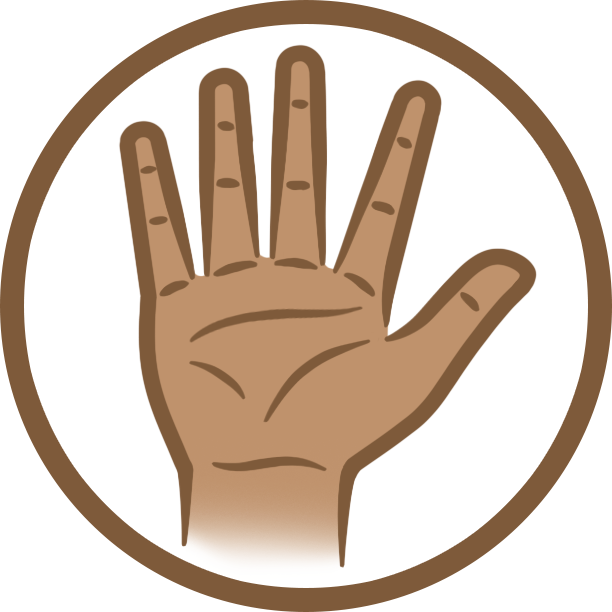Striking
What is a Strike?
A Strike is an attack. When an elohim Strikes they will make a Strike Roll which encompasses both their attempt to attack the Defender and the Defender’s attempt to defend themself.
Striking consumes 3 Action Points during which an elohim can also Move up to 2”. An exception is Strikes (usually a special martial Maneuver) for only 2 Action Points during which the elohim may only Move up to 1”. Maneuvers that require 4 AP still only allow the elohim to Move up to 2". When a character pays extra AP to Strike due to an effect, such as Defensive Stance, the distance they can Move is not also increased.
Most weapons may only Strike Targets within 3” from the center of Striker to the center of the Defender. This is Melee Range. Some weapons allow for Strikes to be made at a Range greater than 3”. These are considered Ranged Strikes. The range requirements must only be met at some point during the Strike. If the elohim Moves during the Strike, they have to be within the correct Range at some point during that movement regardless of where they begin or end.
With a Melee Strike it most often does not matter if there is another elohim in the way between the Striker and the intended Target. The exception is if the elohim in-between is in Defensive Stance and chooses to block the Strike. In that case, the blocking elohim becomes the Target of the Strike instead. With a Ranged Strike the Host may determine that an enemy in Melee Range of the Striker and directly between the Striker and their Target may make the Strike impractical. Otherwise, only a character in Defensive Stance can stop with a Ranged Strike. Physical obstructions do not interfere with Strikes. Spiritual Dominions do prevent Strikes from passing through.
There are several things that can affect parts of the Strike process. Some of these things are: weapons (including Passion Effects), Maneuvers, Spiritual Effects, Songs, Defensive Stance, and Melee Influence.
Making a Strike
The first step is for the Striker to make a Strike Roll using 7D12. The results of each die represent some aspect of how the Strike played out. These aspects in tandem make up the details of that single Strike. Results on each D12 will always produce a certain outcome for that aspect of the Strike. These are as follows:
Hit (positive)
Miss (neutral)
Stop (negative)
-
9-12 is a Hit representing that the Striker Struck well in part
-
4-8 is a Miss representing that either the Striker did not Strike well or the Defender dodged well
-
1-3 is a Stops representing that the Defender resisted or blocked the force of the Strike in part. Each Stop cancels a Hit
There are also additional bonus effects of certain numbers and rolls:
Epic Results
-
"12" is an Epic Hit and produces an additional Hit and triggers any "12" Effect from the weapon being used. (One "12" is canceled for each "1".)
-
"1" is an Epic Stop and causes a Melee Striker to Falter:1. (One "1" is canceled for each "12".) Some Maneuvers or other effects will ignore one or more Stops. Applying this effect to a "1" ignores only the Stop produced by the "1". It does not ignore the ability of the "1" to cancel the extra effects produced by a "12", nor does it ignore the Falter caused by an uncanceled "1".
Epic Rolls
Two or More "12"s
If two or more "12"s are rolled and not canceled by a "1" before any Adjustments are made, the Strike is considered an Epic Strike. Natural "12"s may not be adjusted down in an Epic Strike.
Three "12"s
If the Epic Strike consists of three uncanceled "12"s, then the Defender’s Status is lowered for 1 Cycle to Weakened or Defeated.
Four "12"s
If the Epic Strike includes at least four uncanceled "12"s. then the Defender is automatically Defeated regardless of damage and their Endurance is lowered to -40.
Two or More "1"s
If two or more "1"s are rolled and not canceled by a "12" before any Adjustments are made, the Strike is considered an Epic Defense. Natural "1"s may not be Adjusted up in an Epic Defense.
Three "1"s
If the Epic Defense consists of three uncanceled "1"s, then the Striker’s Status is lowered for 1 Cycle to Weakened or Defeated.
Four "1"s
If the Epic Defense includes at least four uncanceled "1"s, then the Striker is automatically Defeated regardless of damage and their Endurance is lowered to -40.
Adjusting the Strike Roll
After the roll is made, the Striker or the Defender may get to adjust some of the dice. Compare the Striker’s Precision and the Defender’s Guard. Whoever has the greater can make one adjustment for each level greater their number is. Levels occur at 1, 3, 6, 10, and continue at every 5 additional Guard or Precision difference.
| a difference of at least: | gives this many Adjustments: |
| 1 | 1 |
| 3 | 2 |
| 6 | 3 |
| 10 | 4 |
| 15 | 5 |
| 21 | 6 |
| +7 more | +1 more |
{Ex. If Herald, having a Precision of 2, were to Strike a Fallen Warrior with a Guard of 4, then the Warrior would get to make one adjustment to Herald’s Strike Roll. This is because their Guard is 2 higher than Herald’s Precision. 2 is beyond the 1st level, occurring at 1, but less than the 2nd occurring at 3.}
Once all Adjustments are made, determine the results. First, set aside any "12"s or "1"s that have canceled each other. Then, use any remaining Stops to cancel Hits. If there are Hits remaining, the Striker will deal damage to the Defender's Endurance (unless the character’s current weapon would deal a different kind of damage).
Defensive Hits
If there are remaining Stops after all Hits were canceled, the Defender may actually cause damage to the Striker in the form of Defensive Hits. One Defensive Hit is produced by every two (2) uncanceled Stops (remember that everything is rounded down in Allies of Majesty). Defensive Hits use the Defender’s Force with whatever type of damage the Defender’s current weapon inflicts. Passion Effects are applied to Defensive Hits except when a Long Range weapon is equipped.
Determining Passion Effects
If a Striker’s Passion is greater than the Defender’s Resolve, their weapon’s Passion Effect will trigger once. It triggers a 2nd time of Passion exceeds Resolve by at least 40 and a 3rd time if Passion is at least 80 higher. Passion Effects can not trigger more than 3 times without the enablement by a special effect.

[For Flesh, Passion Effects are not considered unless specifically allowed by a special ability.]
Determining Damage
After determining the number of Hits produced, you can determine how much damage is caused to the Defender or the Striker. This is done using the following formula:
Number of Hits x Force = damage.
Add or Subtract total percentages (%).
[For Dry Bones, there may also be a flat amount added by the Axe or Bow 12 Effects.]
Ex. After adjusting and then resolving Herald’s Strike Roll, it is determined that the Strike produced 3 Hits. Herald's Force of 4 is multiplied by the number of Hits to get a damage total of 12.
3 Hits x 4 Force = 12 damage.
Percentages (%) are the sum total of all percentages added or subtracted by effects. The damage is multiplied by the percentage and then rounded down to determine how much will be added to or subtracted from the damage dealt. This is very easy to calculate using the AoM web calculator. (important note: The general rules is everything is rounded down in Allies of Majesty. Remember, the amount to add to or subtract from the damage is what would be rounded down, not the damage to be dealt.)
Ex. A Strike by a Messenger against a Warrior deals 27 damage. Strength in Struggle will cause this to be reduced by 20%. 27 can be multiplied by 0.2 and rounded down to 5, then subtracted from 27 for a total of 22. Alternatively for fewer total steps, 27 can be multiplied by 0.8 and then rounded up to 22.
27 damage - 2/10ths = 27 x 0.2 = 5.4 rounded down to 5.
27 - 5 = 22.
Alternatively with Fewer Steps
27 damage - 2/10ths = 27 x 0.8 = 21.6 rounded up to 22.
If damage were increased by a percentage, rounding down still works because you would simply multiply by the final percentage. 100% + 20% = 120% = multiply damage by 1.2 and round down.
If there is a positive or negative percentage, there is a minimum of 1 damage added or subtracted, even if the percentage would be rounded down to 0. # damage is added before percentages are applied. Any changes to damage are figured before the damage is applied to the Target of the Strike.
Regardless of reductions, there is a minimum damage of 10% of the total Force for every Strike. This is the case for each kind of damage inflicted including Resolve damage from the Bow's Passion Effect.
Ranged Strikes
An elohim may not perform a Ranged Strike on a Target within 3” of the elohim. If the elohim is using a Ranged only weapon, they must move outside of Melee Range during the Strike or Strike a different Target.
Ranged Strikes also differ from Melee Strikes in a few important ways. 1s do not cause Faltering while making a Ranged Strike. Neither do uncanceled 1s cause lowering of Status or Defeat. Also, uncanceled Stops do not produce Defensive Hits.











